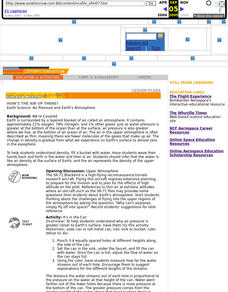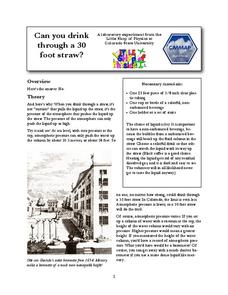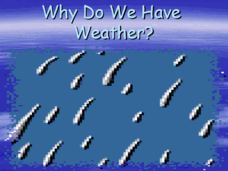Curated OER
Water Pressure
Students spend time examining the concept of water pressure. In groups, they research the amount of air pressure that is felt at different levels above sea level. Using a calculator, they calculate the water pressure given different...
Curated OER
What's Air Got to Do with It?
Students use M&M's to create a pie graph that expresses their understanding of the composition of air. They watch and conduct several simple experiments to develop an understanding of the properties of air (it has mass, it takes up...
Curated OER
Vapor Pressure
In this vapor pressure learning exercise, learners use a given graph of the vapor pressure of four liquids to answer eleven questions. They compare and find boiling points and vapor pressures of propanone, ethanol, water, and ethanoic acid.
Curated OER
GCSE Module 6 Revision Guide-Chemistry-Oil, Fossil Fuels and Earth's Atmosphere
For this oil, fossil fuels and Earth's atmosphere worksheet, students answer 3 questions about the origin of oil and its uses, the effects of burning oil and fossil fuels on the Earth's atmosphere and the origin and maintenance of the...
Curated OER
How's the Air Up There?
Young scholars experiment with soda cans and water to discover why air pressure is greater closer to Earth's surface.
Curated OER
Bicycle Pump Pressure
Students explain that air pressure applies a force. If any of students have flown in an airplane, they have felt the "popping" of their ears caused by the change in atmospheric pressure because of the altitude changes.
Colorado State University
Can You Drink Through a 30 Foot Straw?
Drinking straws are a pretty simple device ... or, are they? Explore the possibility of sipping a beverage 30 feet away with an engaging activity that's sure to keep pupils guessing. Just place a long piece of plastic tubing in a glass,...
Curated OER
Atmospheric Pressure Interactive Learning Demonstration
Learners predict what happens to the balloon as the water in the flask boils. In this physics lesson, students explain why they made such prediction. After the demo, they give some real life examples of this concept.
Curated OER
Why Do We Have Weather?
Convection is offered as the reason behind our weather phenomena. This presentation assumes that viewers are familiar with the methods of heat transfer, and is therefore more geared toward middle-school meteorologists. The focus is on...
K12 Reader
Atmospheric Layers
In this two-part reading comprehension worksheet, kids read a passage about the atmospheric layers surrounding the earth and then respond to a series of comprehension questions based on the passage.
Curated OER
Under Pressure
In this pressure learning exercise, learners read about Dalton's Law of Partial Pressure, about vapor pressure and about collecting gases over water. They answer 6 questions using the concepts of Dalton's Law of Partial Pressure and they...
Colorado State University
Why Does the Wind Blow?
Without wind, the weather man wouldn't have much to talk about! Blow away your junior meteorologists with a creative demonstration of how wind works. The activity uses an empty soda bottle and compressible Styrofoam peanuts to illustrate...
International Technology Education Association
Become a Weather Wizard
Accurate weather forecasting is something we take for granted today, making it easy to forget how complex it can be to predict the weather. Learn more about the terms and symbols used to forecast the weather with an earth science lesson...
Curated OER
Meteorology Madness
Students probe the dynamic weather changes through several hands-0n activities in this seven lessons unit. The hydrologic cycle, clouds, atmosphere, air movement, fronts, and forecasting form the components presented in this unit.
Curated OER
You Can Take the Pressure!
Learners construct and use a barometer over a period of 1-2 weeks to investigate and predict upcoming weather from barometric pressure.
Curated OER
The Air Around You
In this air worksheet, students will answer questions about the Earth's atmosphere, including the layers, air masses, and heat transfer. Students will explore how the difference in atmospheric temperature can create weather patterns....
Curated OER
Feeling Pressured
Young scholars explore pressure in our atmosphere. They examine the relationship between pressure and depth. Students construct an experimental apparatus and take measurements. Young scholars evaluate the impact of pressure on the lungs.
Curated OER
Air -- Is It Really There?
Students work together to perform simple experiments discovering the properties of air. They share their results with their classmates. They examine how engineers use the properties of air to clean the air of pollutants.
Curated OER
Sea of Air #2
In this air worksheet, students name gases found in the air, what gases are removed from the air during different processes, and determine what happens to air if there are changes in pressure, volume, or temperature. This worksheet has 1...
Curated OER
The Goldilocks Principle: A Model of Atmospheric Gases
Students discuss the characteristics of the Goldilocks Principle. They discover the pressure and chemical composition of Venus and Mars. They discuss how the Earth's temperature is affected by the atmosphere.
Curated OER
Air and Aerodynamics
In this science worksheet, middle schoolers find the words that are related to the vocabulary of air and aerodynamics. The answers are found at the bottom of the page.
Curated OER
Weather Forecasting
High schoolers examine cold, warm, and stationary fronts. They also examine the roles of relative humidity and the way air masses move. They are to create forecasts based on the information they collect. Tapes are shared with the class.
Curated OER
Weather
In this weather worksheet, students will match 4 weather terms to their correct definition. Vocabulary words include wind, weather, air mass, and front. Then students will complete 3 short answer questions based on high and low air...
Curated OER
Blowin' in the Wind
Students discover how wind is created on earth: changes in temperatures and air pressure. They list good and bad effects of the wind and make a weather vane and practice using it for 2 weeks.























